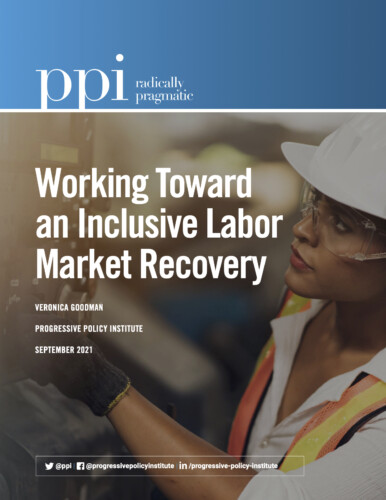While there are promising signs for the overall trajectory of the economic recovery, the latest data from the Bureau of Labor Statistics points to some slowing and the overall picture shows the recovery remains uneven for many workers. Amidst ongoing negotiations in Congress concerning their reconciliation package and news about worker concerns and labor shortages, the Progressive Policy Institute (PPI) has released a new report detailing evidence-based approaches to achieving a more equitable recovery. These policy changes and priorities will ensure all Americans in — and out of — the workforce are empowered to succeed.
“As we recover from the pandemic, Congress, policymakers, and business leaders must prioritize policies that ensure an inclusive economic recovery,” said Veronica Goodman, Director of Social Policy at PPI. “To prevent further economic scarring and to better help those currently out of work quickly pivot to new opportunities, we will need to wield every tool to ensure that the recovery brings all workers along.”
The paper proposes a comprehensive slate of policies for addressing historic and worsening inequities in the workforce, including:
- Better preparing and supporting students in their transition to work by expanding access to career and technical education, apprenticeships, and training programs.
- Equipping adult learners and workers with tools like wraparound services, flexibility in curriculums, building social capital, and training in digital skills, to complete degree and training programs and find jobs in the post-pandemic recovery.
- Providing greater transparency about the credit transfer process for all students, including those with nonlinear paths to degree completion.
- Prioritizing skills-based hiring and addressing degree discrimination, changing hiring technologies that leave qualified workers out, and aligning workforce development programs with in-demand jobs and opportunities.
- Increasing apprenticeship and job training programs across industries, including in early education and child care, that lead to jobs with good wages and benefits for more workers.
- Building on the proven success of Great Recession-era subsidized employment programs, so that disadvantaged workers can transition more quickly and seamlessly to the labor force.
- Increasing the minimum wage, implementing a Living Wage Credit, and making the pandemic EITC expansion permanent.
- Support working parents by investing in supports like child care, universal pre-kindergarten, paid family leave and increasing wages for early education teachers — helping many women and workers of color, while helping parents stay in the labor force.
- Strengthening worker protections and rights to ensure a competitive labor market, including modernizing Unemployment Insurance (UI) to be an “automatic stabilizer” that kicks in when certain economic conditions are met.
Read the paper here.

The Progressive Policy Institute (PPI) is a catalyst for policy innovation and political reform based in Washington, D.C. Its mission is to create radically pragmatic ideas for moving America beyond ideological and partisan deadlock. Learn more about PPI by visiting progressivepolicy.org.
###
Media Contact: Aaron White; awhite@ppionline.org